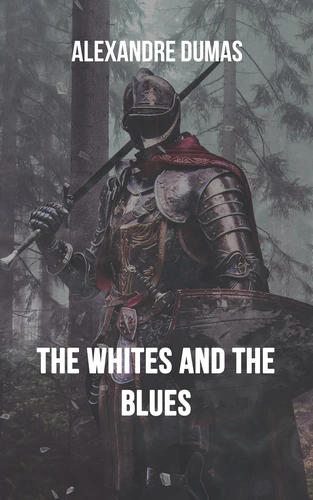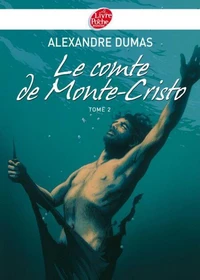On the 21st Frimaire of the year II. (11th of December, 1793), the diligence from Besancon to Strasbourg stopped at nine o'clock in the evening in the courtyard of the Hotel de la Poste, behind the cathedral. Five travellers descended from it, but the youngest only merits our attention. He was a boy of thirteen or fourteen, thin and pale, who might have been taken for a girl dressed in boy's clothes, so sweet and melancholy was the expression of his face.
His hair, which he wore cut a la Titus - a fashion which zealous Republicans had adopted in imitation of Talma - was dark brown; eyelashes of the same color shaded eyes of deep blue, which rested, with remarkable intelligence, like two interrogation points, upon men and things. He had thin lips, fine teeth, and a charming smile, and he was dressed in the fashion of the day, if not elegantly, at least so carefully that it was easy to see that a woman had superintended his toilet.
The conductor, who seemed to be particularly watchful of the boy, handed him a small package, like a soldier's knapsack, which could be hung over the shoulders by a pair of straps. Then, looking around, he called: "Hallo! Is there any one here from the Hotel de la Lanterne looking for a young traveller from Besancon?" "I'm here, " replied a gruff, coarse voice. And a man who looked like a groom approached.
He was hardly distinguishable in the gloom, in spite of the lantern he carried, which lighted nothing but the pavement at his feet. He turned toward the open door of the huge vehicle. "Ah! so it's you, Sleepy-head, " cried the conductor. "My name's not Sleepy-head; it's Cocles, " replied the groom, in a surly tone, "and I am looking for the citizen Charles." "You come from citizeness Teutch, don't you?" said the boy, in a soft tone that formed an admirable contrast to the groom's surly tones.
"Yes, from the citizeness Teutch. Well, are you ready, citizen?" "Conductor, " said the boy, "you will tell them at home - " "That you arrived safely, and that there was some one to meet you; don't worry about that, Monsieur Charles." "Oh, ho!" said the groom, in a tone verging upon a menace, as he drew near the conductor and the boy. "Well, what do you mean with your 'Oh, ho'?" "I mean that the words you use may be all right in the Franche-Comte, but that they are all wrong in Alsace." "Really, " said the conductor, mockingly, "you don't say so?" "And I would advise you, " continued citizen Cocles, "to leave your monsieurs in your diligence, as
On the 21st Frimaire of the year II. (11th of December, 1793), the diligence from Besancon to Strasbourg stopped at nine o'clock in the evening in the courtyard of the Hotel de la Poste, behind the cathedral. Five travellers descended from it, but the youngest only merits our attention. He was a boy of thirteen or fourteen, thin and pale, who might have been taken for a girl dressed in boy's clothes, so sweet and melancholy was the expression of his face.
His hair, which he wore cut a la Titus - a fashion which zealous Republicans had adopted in imitation of Talma - was dark brown; eyelashes of the same color shaded eyes of deep blue, which rested, with remarkable intelligence, like two interrogation points, upon men and things. He had thin lips, fine teeth, and a charming smile, and he was dressed in the fashion of the day, if not elegantly, at least so carefully that it was easy to see that a woman had superintended his toilet.
The conductor, who seemed to be particularly watchful of the boy, handed him a small package, like a soldier's knapsack, which could be hung over the shoulders by a pair of straps. Then, looking around, he called: "Hallo! Is there any one here from the Hotel de la Lanterne looking for a young traveller from Besancon?" "I'm here, " replied a gruff, coarse voice. And a man who looked like a groom approached.
He was hardly distinguishable in the gloom, in spite of the lantern he carried, which lighted nothing but the pavement at his feet. He turned toward the open door of the huge vehicle. "Ah! so it's you, Sleepy-head, " cried the conductor. "My name's not Sleepy-head; it's Cocles, " replied the groom, in a surly tone, "and I am looking for the citizen Charles." "You come from citizeness Teutch, don't you?" said the boy, in a soft tone that formed an admirable contrast to the groom's surly tones.
"Yes, from the citizeness Teutch. Well, are you ready, citizen?" "Conductor, " said the boy, "you will tell them at home - " "That you arrived safely, and that there was some one to meet you; don't worry about that, Monsieur Charles." "Oh, ho!" said the groom, in a tone verging upon a menace, as he drew near the conductor and the boy. "Well, what do you mean with your 'Oh, ho'?" "I mean that the words you use may be all right in the Franche-Comte, but that they are all wrong in Alsace." "Really, " said the conductor, mockingly, "you don't say so?" "And I would advise you, " continued citizen Cocles, "to leave your monsieurs in your diligence, as

























